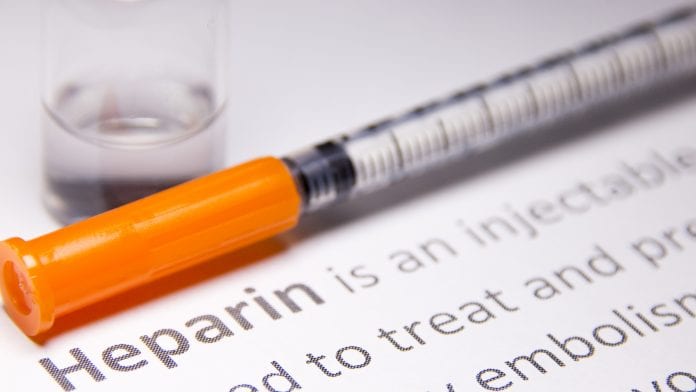
A study has found that implementing a full dose of a standard blood thinner medication can significantly reduce deaths in moderately ill hospitalised COVID-19 patients.
The investigation, led by researchers at St. Michael’s Hospital and the University of Vermont Larner College of Medicine, has determined that a commonly utilised blood thinner medication is proficient in stopping the thrombo-inflation process that is a deadly symptom of COVID-19, providing better outcomes for moderately ill hospitalised patients.
The research is published in MedRxiv.
Heparin blood thinner medication
A deadly characteristic of COVID-19 is heightened inflammation and abnormal clotting in the blood vessels – more specifically in the lungs – which experts believe exacerbate the effects of the disease, often resulting in death. Now, novel trial results have indicated that heparin – a blood thinner medication that is traditionally administered to hospitalised patients in low doses – is effective in mitigating clots from forming and decreasing inflammation.
Mary Cushman, the co-principal investigator of the study and a professor of medicine at the University of Vermont’s Larner College of Medicine, said: “This study was designed to detect a difference in the primary outcome that included ICU transfer, mechanical ventilation or death.”
Searching for the optimal dose
To analyse the benefits of administering a full therapeutic dose of heparin compared to a low prophylactic dose to moderately ill hospitalised COVID-19 patients, the team performed an open-label randomised international multi-centre RAPID Trial. The primary outcome was a composite of ICU admission, mechanical ventilation, or death within 28 days. The primary outcome was observed in 37 out of 228 (16.2%) of the patients who received a full therapeutic dose of the blood thinner medication and 52 of 237 (21.9%) for those with the low dose. Furthermore, four patients who received the therapeutic dose died, compared to 18 who were administered prophylactic heparin.
Michelle Sholzberg, the first author of the study and Head of the Division of Hematology-Oncology at St. Michael’s Hospital, said: “While we found that therapeutic heparin didn’t statistically significantly lower incidence of the primary composite of death, mechanical ventilation or ICU admission compared with low dose heparin, the odds of all-cause death were significantly reduced by 78% with therapeutic heparin.”
In addition to their RAPID trial, the team performed a meta-analysis of randomised evidence, including data from a large multiplatform trial of ATTACC, ACTIV-4a and REMAP-CAP, which signified that therapeutic heparin is beneficial to moderately ill hospitalised COVID-19 patients, although not in severely ill ICU patients.
Sholzberg said, “We believe that the findings of our trial and the multiplatform trial taken together should result in a change in clinical practice for moderately ill ward patients with COVID-19.”









